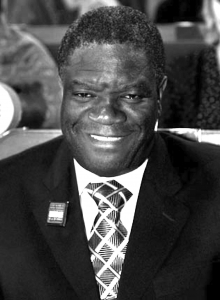School Hosts Discussion with Dr. Denis Mukwege, an Ob/Gyn helping women in war-torn Congo
In a region of the world with plenty to despair, Dr. Mukwege is building a "City of Joy.
On November 16, the U-M School of Nursing’s Office of Global Outreach (GO) sponsored a reception with Dr. Denis Mukwege, an Ob/Gyn who has dedicated his career to help female victims of sexual violence in war-torn Congo. In town to accept the U-M Wallenberg Award for his humanitarian efforts and to present the 2010 Wallenberg lecture,  he was a man in high demand.
he was a man in high demand.
So, with an interpreter by his side, the French-speaking Dr. Mukwege sipped coffee as Tenley Mogk, a student in the U-M School of Nursing Second Career Program, explained the public health project she worked on in Dr. Mukwege’s home country. From 2001-2003, Mogk was a University of Michigan Populations Fellow and, as such, her task was to travel to the Democratic Republic of Congo (DRC) and reintroduce family planning programs and supplies to the country. Her description of the country’s almost non-existent road system, her contextualizing of the DRC as roughly the size of the eastern third of the United States, and her explanation of the incredible war-related sexual violence occurring in the eastern part of the country set the stage for an intimate conversation with Dr. Mukwege, a man and physician who knows the scale of these atrocities all too well.
In response to Mogk’s presentation, Dr. Mukwege reflected that when he was a child in the Congo, modern forms of birth control were never really necessary; instead, through breastfeeding her child for the first two years of their life, mothers were able to space their pregnancies at least this far apart. But now, he says, this natural method is ineffective because mothers simply have to work too hard to feed themselves and their children to continue breastfeeding for that long. The point, he explains, is that there’s a cultural shift that’s happened: “It used to be that a nursing mother was like a princess and the whole community mobilized its efforts around her to make sure she and her children were taken care of.” Now, that strong sense of community just isn’t there.
And this context, in which women are no longer valued as they once were, is the context in which Dr. Mukwege has set himself the task of literally putting women back together through post-sexual violence reconstructive surgery. But, having operated on more than 21,000 women in his career, he aims to do more than just make them whole physically: “People may not believe it, but it’s women who have the power… And, when they succeed, it is good for them but also for the people around them. While men use power to elevate themselves and keep others down, a woman’s power gets shared with her community to the benefit of everyone.” From this premise arose the idea for a “City of Joy,” a community where survivors of the most extreme forms of sexual violence live, heal, and learn their own power as a change agent and autonomous being in their communities: “Women have tremendous ability, and what we’re trying to do is turn their unbearable pain into their power.”
Despite his packed itinerary during his trip to the University of Michigan campus in Ann Arbor, Dr. Mukwege said he appreciated his ability to forge relationships with so many people during his trip and, he quipped, he was still hopeful that he’d be able to recruit a nurse to come to the Congo with him and work in his clinic. Emphasizing the critical role nurses play in his work, he said “When we do a fistula surgery, the only thing that can ensure success is a good team of nurses. Even if I [as the physician] do my job perfectly, it’s the nurses who make it all happen.”





